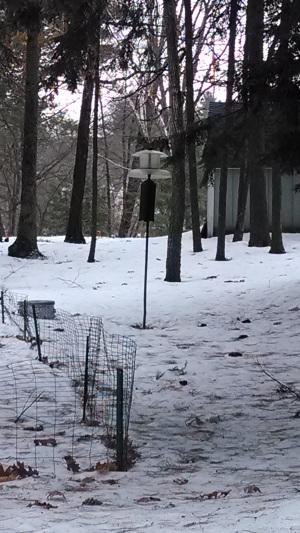
A neighbor’s feeder
At my last local chicken workshop, the very last question was one of those “this isn’t really about chickens but I have a question about something else” – questions.
I love those kinds of questions because 1. It shows that the participant has been paying attention and 2. They really want to know more about the care of their chickens. I told him to fire away.
“What about wild birds?”
Which is an *excellent* question and one for which I got into hot water with the chicken community a while back because in my workshops I strongly advise that if you choose to have a backyard chicken flock, you should not encourage wild birds to come into your yard. That means no bird feeders.
It’s one or the other in my book.
The problem with this though, is that if you like chickens, chances are you like wild birds as well. And if there’s one thing I’ve learned, it’s don’t get between a wild bird lover and her birds.
I’ve actually spoken to some vets about this topic and those conversations on top of my microbiological background have led me to these conclusions.
There are four diseases that wild birds can typically carry:
- Salmonellosis
- Trichomoniasis
- Aspergillosis
- Avian Pox
If you have a backyard, you will have birds in it and you will have wild birds fly *over* it potentially leaving droppings that are contaminated with bacteria, fungus, or parasites.
This is a given, unless you put your yard in a bubble, it’s going to happen.
HOWEVER, if you have a bird feeder in your yard, you increase what is known as the “pathogen load” which increases the chances that your chickens *might* be exposed. If you have a feeder in your yard, then birds will be attracted to that food. They will scratch (causing some of the food to fall on the ground – essentially ensuring that your chickens will congregate for a tasty snack) and as a result of sitting and eating the food at the feeder, the wild birds will defecate in a concentrated area (sometimes you’ll even find areas of concentration under favorite nearby tree branches.)
Again a higher concentration of bird poop increases the chances that a disease can be passed on to your flock.
So what is a chicken owner to do?
- We don’t have bird feeders in our yard, that’s my suggestion to other poultry owners. Our neighbors do, but we don’t. We still have a lot of birds in our yard (they find our chicken feed pretty darn tasty themselves) but at least we don’t have a spot where they can stop and eat for long periods of time.
- If we did have a bird feeder and I was hell-bent on keeping it, I would put a high fence around it to make sure the chickens didn’t have access to the dropped feed and poop area directly underneath.
- Speaking of feed, we try to contain our chicken feed in order to keep it away from birds and rodents. All feed is put in feeders or troughs and any extra feed is stored in lidded galvanized steel containers.
- We don’t have a cat but our neighbors do and it is an outdoor cat. While we have to keep an eye on it with regard to our chickens, I think that it may be helping at the very least to scare off our wild birds. A cat could be a very simple solution (provided it does not attack your flock.)
Look, you’re not going to stop birds flying over or even stopping in your yard, but with a few simple steps and awareness of what could happen, you just might be able to at least limit cross bird contamination.
***
Wendy Thomas writes about the lessons learned while raising children and chickens in New Hampshire. Contact her at [email protected]
Also, join me on Facebook to find out more about the flock (children and chickens) and see some pretty funny chicken jokes, photos of tiny houses, and even a recipe or two.
Like what you read here? Consider subscribing to this blog so that you’ll never miss a post. And feel free to share with those who may need a little chicken love.

